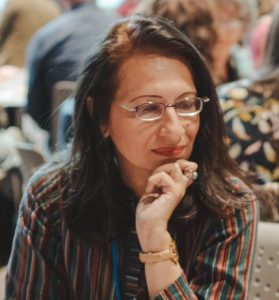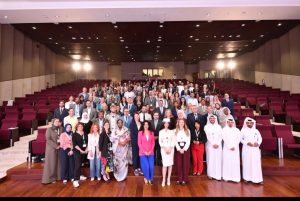Alternatives to global development and humanitarianism – approach with caution
28 Apr 2025

Themrise Khan, Independent Professional
The global development and humanitarian sector is in a state of deep crisis. The abrupt dismantling of USAID some months back has precipitated an existential reckoning, locating the sector at a crossroads. Meanwhile, the multiple, complex and intersecting global issues that the sector was originally established to address are only getting worse, from violent conflict, to human displacement, to climate induced disaster, to inequality.
It was against this background of maelstrom and uncertainty, that the Humanitarian Leadership Conference recently took place in Doha, Qatar. Co-organized by the Centre for Humanitarian Leadership, Australia and the Center for Conflict and Humanitarian Studies, Qatar, the event brought together hundreds of global humanitarian professionals, philanthropists and development practitioners.
Over the course of the two days, Global South community practitioners and activists sat across the table from INGO CEOs and philanthropic foundation representatives. Each trying to reflect on their own past positioning and current positionality as possible disrupters to the status quo, in this new “no aid” reality.
Participants from the Global South offered some clear ways forward. The messages from representatives from war-ravaged countries like Sudan, Afghanistan, Palestine, Syria and Myanmar, were all about putting their challenges front and centre. And their people. Representatives from Sudan, for instance, were extremely vocal about how their country had been largely and consistently ignored in the discussion around both local and international humanitarian assistance. It was in Sudan where the idea of Emergency Response Rooms (ERRs) – an entirely Sudanese devised and led concept – emerged amongst a horrendous war. Likewise, representatives from Myanmar, still reeling from a devastating earthquake only weeks earlier, were cautious about the need for international support in a highly sensitive political and military environment, where local first responders were in dire need of assistance, but limited by their country’s exposure to the outside world.
On the other hand, messages from INGOs and philanthropy, more accurately, foundations associated with billionaire philanthropy, were far less clear. There was no indication of power shifts occurring in that space anytime soon. CEOs of global INGOs claimed that transformative change was slow – and difficult – because of the internal resistance of their own bureaucracies. Philanthropic foundations, meanwhile, seemed to be unaware of how much power they occupied in the sector, let alone provided any indication of supporting radical reform. Both, instead of being accountable for their actions, were defensive of their privileged positions. This is unfortunate, given that both have the opportunity to use their global influence to advocate for issues, but are limited by their respective power structures (that is a separate blog altogether, especially related to billionaire philanthropy).
“Both, instead of being accountable for their actions, were defensive of their privileged positions.”
Talk of a “humanitarian reset” as recently circulated by the UN Humanitarian Relief Coordinator, was top of mind among many conference participants. What was missing however, on both sides of the power divide, was any sense of a galvanizing vision, let alone an agreed approach as to how to move forward in this moment of global crisis. Words like “localization” and “locally-led” still show little evidence of any transformation of financial and decision-making power. And no one, particularly the Northern INGOs, was talking about taking a back seat, let alone vacating their spaces.
At the #ShiftThePower Global Summit in Bogotá in December 2023, there was a strong call for new ways of doing in international philanthropy and development that centred and was led by Global South organizations and communities. At the time the need to explore and experiment with alternatives was nowhere as urgent as it is today. But the models and new ways of working that were proposed by a global audience then, remain as elusive as they are today.
This is because alternatives to current development models, as reflected in my own work and that of many others in the Global South, are still emergent in their nature, not wholly implementable, in need of further exploration, refinement and experimentation. Government and civil society, which in many contexts have operated for too long in their own silos, need more than ever to be brought together. Gaps need to be filled: gaps in ideas and approaches that emanate from the Global South and which resonate with the people at the centre of the cause. We keep talking about it, but we have not been and are still not doing it – despite the dire situation we face today.
In such a space, we need to trigger what I call, a “triple R” approach: radical, resistive and redistributive. How we approach development nationally, must be led by national governments, civil society and activists, all of whom must be ready to take risks in an attempt to do better by their responsibilities. These players must resist dependency on external sources of funding and internal power struggles which might create parallel systems of power. And the approach these players take towards their own development must involve the redistribution of resources fairly amongst their own peoples.
“We cannot perpetuate the same power systems we are claiming to dismantle by creating new institutions of power; be they in the North or South.”
At this moment of global crisis, we have to pursue and build alternatives. But because of our past dependency and lack of risk taking, we need to proceed with much caution. We cannot perpetuate the same power systems we are claiming to dismantle by creating new institutions of power; be they in the North or South. The sense of urgency we face today may lead to this and we must avoid the urge to rush into untested ways. We have never built alternatives, especially in the Global South where we have squandered many of the alternatives we had at our disposal (tax equality, legal reform, trade liberalization, etc.). So we need to be sure of where we are heading.
To forge this path, we need to follow some core principles that could ground our quest of working towards a more equitable system of development and humanitarianism.
- We need to talk about and encourage, a new national world order, not a new international world order. Countries need to strengthen and establish their own systems before we can speak of changing global systems.
- Billionaire philanthropy cannot and should not “fill the gap” of funding we now face, because they risk, and in many ways are, perpetuating the same system of power inequalities we talk about dismantling.
- This is not about “reforming” the aid sector, as many are now saying. It is about encouraging a new way of doing things where “aid” is no longer the only tool of choice to do good. It is about encouraging and supporting a range of options that work differently in different contexts.
- Leadership is not about just people or their designations. We need a system that leads, not necessarily people who lead. The collapse of the global aid system is evidence that the system was at fault, not necessarily the people who led it.
- If Western INGOs claim that their global bureaucracies are averse to change, then it is clear that they are also averse to challenging them. This does not necessarily make them a trusted partner to look towards for leadership in allowing the Global South to “lead.”
- For anything to change, a middle ground has to be reached where some give up power and others obtain power. But this is also problematic because it contains the element of “power”, something that can be misused by both sides. The struggle should not be about power. It should be about autonomy and independence.
By: Themrise Khan, Independent Professional. Themrise if the author of the report Envisioning an alternative ecosystem for global development and humanitarianism – responses from community organizations from the Global South, published by the GFCF in January 2025.


